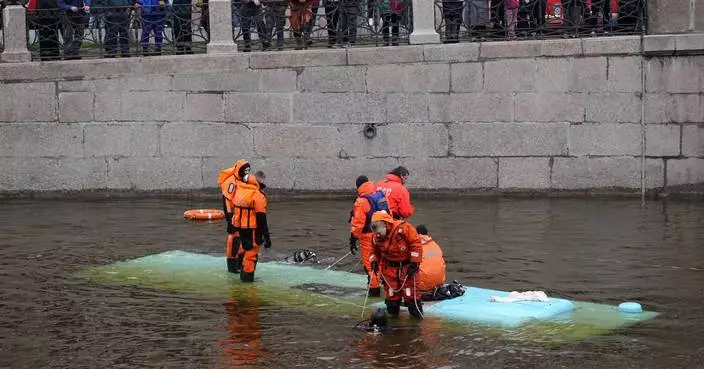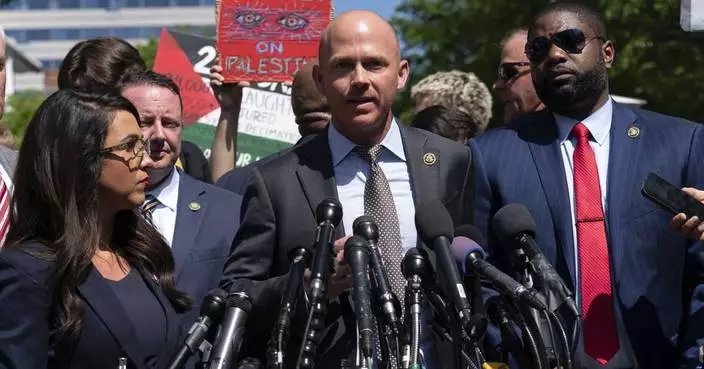This is a miracle to the family!
A very rare condition happened to a Chinese baby that he had three legs in his body.
Click to Gallery
This is a miracle to the family!
Xiao Fei underwent a 10-hour complex operation at a hospital in Shanghai on Mondy to remove the middle leg without function.
Surgeon Chen Qiu described Xiao Fei's operation as "highly complicated". To keep Xiao Fei's right leg, which was shaped like a hand and could not function properly, doctors tried to transplant the foot on the extra leg onto his right leg.
The director of the Department of Urology of the hospital, Bao Juan, said surgeons would bring Xiao Fei's right testicle down from the abdomen to its normal place in the same operation.
Xiao Fei's father Ma Xiaolong thanks to hospital, "I thank the doctors very much. I was so nervous sitting outside the surgery room, but now after I see my child, I'm not nervous anymore."
The 11-month-old baby, nicknamed Xiao Fei, had three legs which surgeons said the extra one didn't belong to him, but his partially formed parasitic twin. The case occurs in around one in a million live births.
According to local reports, Xiao Fei's family come from Xinjiang in western China. His mother didn't find Xiao Fei's parasitic twin since she had not done regular pregnancy checks. She looked for treatments across China after giving birth to him. They were finally admitted into the Shanghai Public Health Clinica.
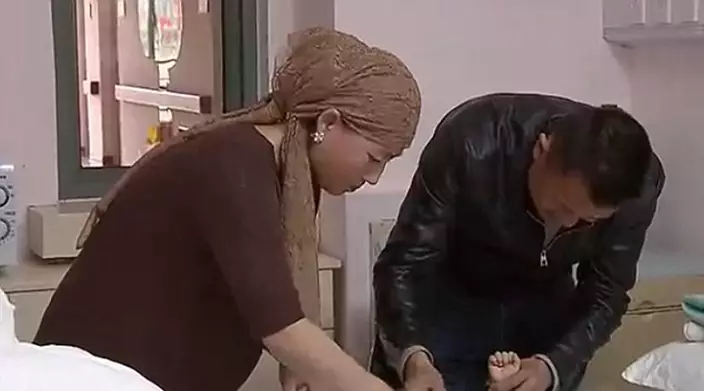
Online photo
Xiao Fei underwent a 10-hour complex operation at a hospital in Shanghai on Mondy to remove the middle leg without function.

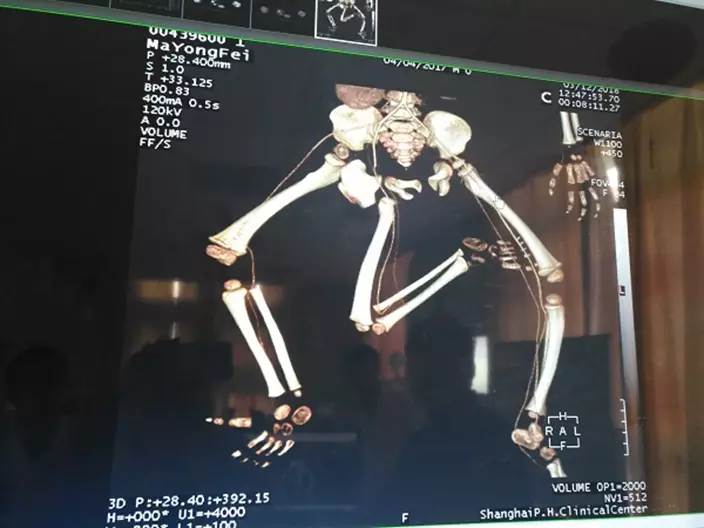
Online photo
Surgeon Chen Qiu described Xiao Fei's operation as "highly complicated". To keep Xiao Fei's right leg, which was shaped like a hand and could not function properly, doctors tried to transplant the foot on the extra leg onto his right leg.
Except for the extra limb, the baby had also suffered from a series of other illnesses, including an undescended testicle, abdominal hernia and congenital heart disease.
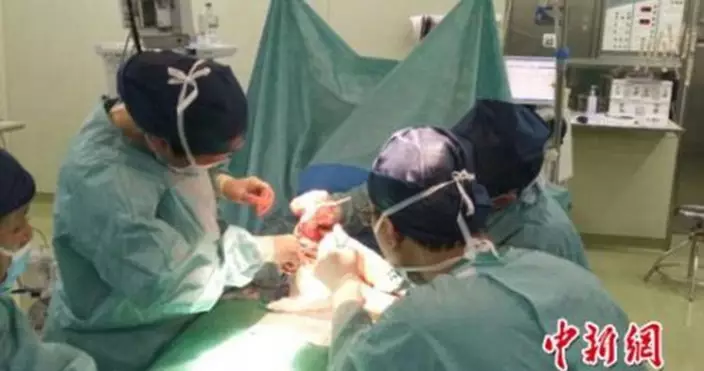
People's Daily
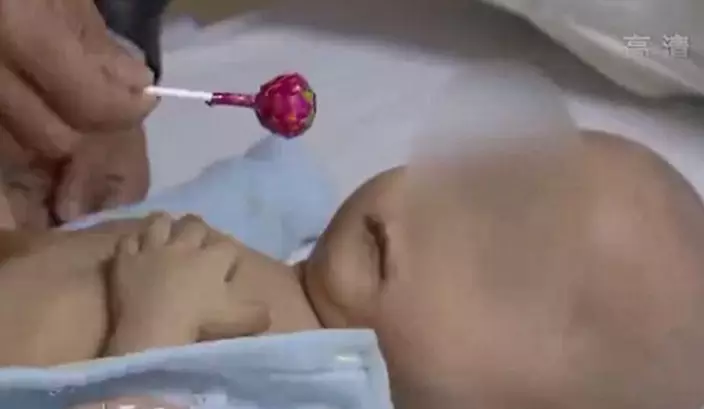
Dragon Television
The director of the Department of Urology of the hospital, Bao Juan, said surgeons would bring Xiao Fei's right testicle down from the abdomen to its normal place in the same operation.
The operation started from 10 am and finished at 7:35 pm. Doctors claimed it a success.

Dragon Television
Xiao Fei's father Ma Xiaolong thanks to hospital, "I thank the doctors very much. I was so nervous sitting outside the surgery room, but now after I see my child, I'm not nervous anymore."
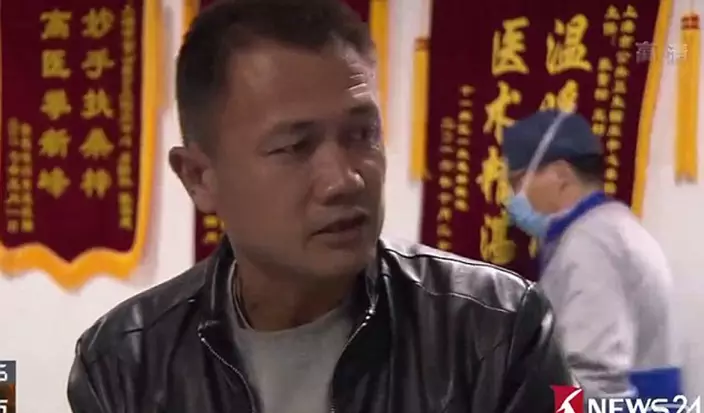
Dragon Television
TOPEKA, Kan. (AP) — Proposed restrictions in Kansas on the foreign ownership of land died Friday when the state's Democratic governor vetoed a bill that top Republican lawmakers argued would protect military bases from Chinese spying.
The Kansas House's top GOP leader accused Gov. Laura Kelly of “apathy” toward serious national security threats from China and other nations declared by the U.S. government to be adversaries “of concern,” including Cuba, Iraq, North Korea and Venezuela. The bill would have prohibited more than 10% ownership by foreign nationals from those countries of any non-residential property within 100 miles of any military installation — or most of Kansas.
A Kansas State University report last fall said Chinese ownership accounted for a single acre of privately owned Kansas agricultural land and all foreign individuals and companies owned 2.4% of the state's 49 million acres of private agricultural land. The bill would have required the university to compile annual reports on all foreign real estate ownership, including non-agricultural business property.
Kelly said in her veto message that while Kansas needs stronger protections against foreign adversaries, the bill was so “overly broad” that it could disrupt “legitimate investment and business relationships.”
“I am not willing to sign a bill that has the potential to hurt the state’s future prosperity and economic development,” Kelly said in her veto message.
Kansas exported $14.1 billion worth of products in 2023, according to the U.S. Department of Commerce's International Trade Administration. China was its fourth-largest trading partner, with $848 million worth of exports, behind Mexico, Canada and Japan.
But Kansas already limits corporate ownership of agricultural land. More than 20 other states restrict foreign land ownership, according to the National Agricultural Law Center.
Early in 2023, before being shot down, a Chinese spy balloon floated across U.S. skies for several days, including over northeast Kansas, home to Fort Leavenworth, home to the U.S. Army's college for training commanders. That intensified interest in restrictions on foreign land ownership in Kansas, though concerns existed already because of the construction of a national biosecurity lab near Kansas State University.
Kansas House Majority Leader Chris Croft, a Kansas City-area Republican and retired Army officer who was among the most vocal supporters of the bill, said Kelly's veto leaves its military bases and other critical infrastructure “wide open for adversarial foreign governments.”
“The assets of this state are too important for us to sit on our hands and wait until it’s too late,” Croft said in a statement after the veto.
Some conservative Republicans, including Kansas Attorney General Kris Kobach, pushed for even stronger restrictions. Kobach backed a plan to ban all foreign ownership of more than 3 acres of land, with a new state board able to make exceptions.
“Despite the governor’s apathy, we’ll continue to work to protect Kansas and its citizens from those foreign bad actors who wish to exploit land ownership loopholes,” House Speaker Dan Hawkins, a Wichita Republican said.
A few Republicans in the state Senate balked at the restrictions, and the bill appeared to be just short of the two-thirds majority necessary to override a veto. The bill would have given affected foreign individuals and companies two years to divest themselves of their Kansas properties.
Critics suggested attributed support for the bill to xenophobia. They suggested the main effect would be to force immigrants — including those fleeing repressive regimes — to sell their shops and restaurants.
“To the extent that this bill affects anyone, it affects everyday people, those who are trying to live the American dream," Democratic state Rep. Melissa Oropeza, of Kansas City, Kansas, said ahead of one vote on the bill.

Kansas state Rep. Rui Xu, D-Westwood, watches from the Senate floor as the chamber debates proposed restrictions on foreign ownership of land in Kansas, Saturday, April 6, 2024 at the Statehouse in Topeka, Kan. Xu strongly opposed the bill, viewing it as xenophobic, and Democratic Gov. Laura Kelly has vetoed it. (AP Photo/John Hanna)

Kansas state Sen. Mike Thompson, R-Shawnee, answers questions from reporters about proposed restrictions on foreign ownership of land in Kansas as Kansas Attorney General Kris Kobach watches, during a news conference Tuesday, Feb. 6, 2024 at the Statehouse in Topeka, Kan. Democratic Gov. Laura Kelly has vetoed proposed restrictions approved by the Republican-controlled Legislature. (AP Photo/John Hanna)














